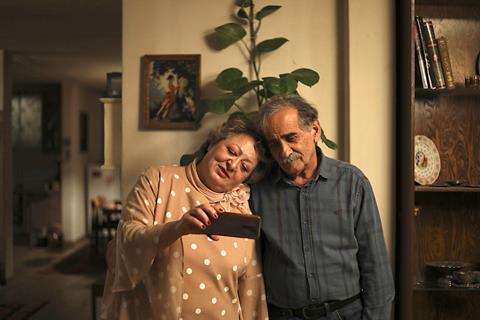Iranian Filmmakers Placed Under New Travel Ban, Preventing Premiere Attendance My Favourite Cake Iranian filmmakers Maryam Moghaddam and Behtash
Iranian Filmmakers Placed Under New Travel Ban, Preventing Premiere Attendance
My Favourite Cake
Iranian filmmakers Maryam Moghaddam and Behtash Sanaeeha, whose film My Favourite Cake premiered in Competition in Berlin, have been placed under a new travel ban by Iranian authorities, preventing Moghaddam from attending the film’s premiere in Sweden.
The Iranian government had previously banned the co-directors from attending the world premiere in Germany in February. The government recently returned their passports, however Moghaddam posted on Instagram that she was stopped by authorities at Tehran’s airport on the way to Sweden and informed that both filmmakers were prohibited from leaving the country.
Sanaeeha told Screen that he was not traveling, but was with Moghaddam at the airport when his co-director was prevented from departing. They met with prosecutors the next day and were informed they cannot leave Iran and will be summoned to appear before court. “It’s a new case, and we don’t understand what is happening,” Sanaeeha said.
Moghaddam’s open letter on Instagram condemned the government’s actions. “Is it because of a hidden agenda to mentally and psychologically abuse us?” she wrote, before addressing Iran’s president Masoud Pezeshkian directly: “You cannot lead a society to growth and reform through deception.”
About the Film
The Iranian tragicomedy follows a 70-year-old woman who breaks out of her solitary routine by trying to invigorate her love life. The film faced backlash in Iran since it includes scenes of a woman not wearing a hijab and people drinking alcohol and dancing.
International Response
At the press conference for the film in Berlin, Moghaddam and Sanaeeha were represented by two empty seats and a joint cardboard portrait. The film’s lead actress Lily Farhadpour was able to travel to the festival and read a statement on their behalf in which the filmmakers said they felt like “parents who are forbidden from even looking at their new-born child.”
They added: “We’ve decided to cross all of the restrictive red lines and accept the consequences of our choice to paint a real picture of Iranian women.”
France’s Totem Films has sold My Favourite Cake to more than 40 territories. It is produced by Iran’s Filmsazan Javan, France’s Caractères Productions, Sweden’s Hobab, and Germany’s Watchmen Productions. Curzon just released the film in the UK and Ireland on September 13.
Sweden’s culture minister Parisa Liljestrand wrote an open letter on Instagram condemning the actions of the Iranian authorities and calling the film “a movie that speaks to our empathy, our humor, our humanity – these kinds of works are dangerous for those in power who cannot stand to be questioned”. Liljestrand added: “This also shows why we must always stand up for artistic freedom, both here at home and out in the world.”
The Swedish directors association has also made an appeal in an open letter urging the Iranian government to reconsider.
Conclusion
The ban on Moghaddam and Sanaeeha highlights the ongoing struggle for artistic freedom in Iran. The film’s themes of love, freedom, and empowerment are a powerful commentary on the lives of Iranian women, and the government’s attempts to suppress it are a testament to the power of art to challenge authority.
FAQs
Q: Why was the film banned in Iran?
A: The film was banned due to its depiction of a woman not wearing a hijab and people drinking alcohol and dancing, which are considered taboo subjects in Iran.
Q: What is the current status of the film’s premiere in Sweden?
A: Due to the travel ban, Moghaddam is unable to attend the premiere in Sweden, but the film is still scheduled to be shown.
Q: What is the international response to the ban?
A: The international film community has widely condemned the ban, with many filmmakers and industry professionals expressing their support for Moghaddam and Sanaeeha.

COMMENTS